|
|
|
Sort Order |
|
|
|
Items / Page
|
|
|
|
|
|
|
| Srl | Item |
| 1 |
ID:
178139
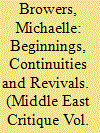

|
|
|
|
|
| Summary/Abstract |
This article examines some of the first translations of Gramsci into Arabic by young, New Left figures associated with a short-lived group called “Socialist Lebanon.” Thinking à la Edward Said about the undertaking of translations of ideas from one context to another and one language to another as a potentially productive act of beginning, I argue that these first translations, undertaken as part of a revolutionary praxis of young, militant intellectuals, not only reveal some of the limitations and possibilities in the development of a Gramscian analysis of Lebanese politics. Rather, their efforts were central to the formation of a New Arab Left and the strands of those beginnings not only are detected in the later work of several of these activist-translators, even after they had moved beyond militant politics, but also remain visible in later revolutionary praxis in the region. By foregrounding the way in which each subsequent “Gramsci boom” (in the 1990s and after 2010) exists in relationship to an ongoing revolutionary praxis that reads and translates the Arab Left anew, I also seek to provide evidence of what Michele Filippini refers to in this issue as an “Arab provincialization” of Gramscian thought and what I prefer to highlight as a continuous tradition of Arab Left revolutionary praxis.
|
|
|
|
|
|
|
|
|
|
|
|
|
|
|
|
| 2 |
ID:
171000
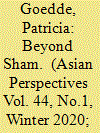

|
|
|
|
|
| Summary/Abstract |
The Constitution of the Democratic People's Republic of Korea is often dismissed as a valid legal instrument within the larger framework of the North Korean legal system. This is an unsurprising outcome given the portrayal of North Korea as a totalitarian dictatorship, documented human rights abuses, and the lack of access to the country's lawmaking processes. It is also a foreseeable result if comparisons are made to liberal democratic constitutions where rights guarantees and judicial review are defining elements. However, the North Korean Constitution deserves more nuanced scrutiny in light of evolving research on socialist and authoritarian constitutionalism in Asia. This article argues that the DPRK Constitution should be included more substantively within the analytical frameworks of Asian, socialist, and authoritarian constitutionalism by virtue of how it functions to nation-build, legitimate institutional leadership, signal ideological shifts, regulate society on collectivist, duty-based principles, and guide economic reforms for development and modernization.
|
|
|
|
|
|
|
|
|
|
|
|
|
|
|
|
| 3 |
ID:
110396
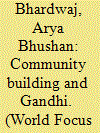

|
|
|
| 4 |
ID:
101270


|
|
|
|
|
| Publication |
2010.
|
| Summary/Abstract |
This article is a study of socialist feminist cultural practices in the early PRC. It investigates stories behind the scenes and treats the All-China Women's Federation's official journal Women of China as a site of feminist contention to reveal gender conflicts within the Party, diverse visions of socialist transformation, and state feminist strategies in the pursuit of women's liberation. A close examination of discrepancies between the covers and contents of the magazine explicates multiple meanings in establishing a socialist feminist visual culture that attempted to disrupt gender and class hierarchies. Special attention to state feminists' identification with and divergence from the Party's agenda illuminates a unique historical process in which a gendered democracy was enacted in the creation of a feminist cultural front when the Party was consolidating its centralizing power. The article demonstrates a prominent "gender line" in the socialist state that has been neglected in much of the scholarship on the Mao era.
|
|
|
|
|
|
|
|
|
|
|
|
|
|
|
|
| 5 |
ID:
144919
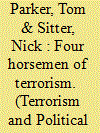

|
|
|
|
|
| Summary/Abstract |
David Rapoport's concept of Four Waves of terrorism, from Anarchist terrorism in the 1880s, through Nationalist and Marxist waves in the early and mid-twentieth century, to the present Religious Wave, is one of the most influential concepts in terrorism studies. However, this article argues that thinking about different types of terrorism as strains rather than waves better reflects both the empirical reality and the idea that terrorists learn from and emulate each other. Whereas the notion of waves suggests distinct iterations of terrorist violence driven by successive broad historical trends, the concept of strains and contagion emphasizes how terrorist groups draw on both contemporary and historical lessons in the development of their tactics, strategies, and goals. The authors identify four distinct strains in total—Socialist, Nationalist, Religious, and Exclusionist—and contend that it is possible to trace each strain back to a “patient zero” active in the 1850s.
|
|
|
|
|
|
|
|
|
|
|
|
|
|
|
|
| 6 |
ID:
100031
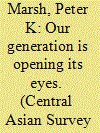

|
|
|
|
|
| Publication |
2010.
|
| Summary/Abstract |
This study examines the development of popular music in Mongolia over roughly four decades, focusing in particular on the emergence of globally inspired hip-hop and rap music. This is the period in which Mongolian popular musicians found their own voice within a rapidly expanding cultural mainstream. Hip-hop emerged within this mainstream as both a product of these developments and the result of the rise of a new generation of young people who defined themselves as distinct from the older, 'socialist-era' generations and used this music to declare this. The story of hip-hop's development provides us with a window onto the changing social, political and economic landscape of post-socialist Mongolia.
|
|
|
|
|
|
|
|
|
|
|
|
|
|
|
|
| 7 |
ID:
092009
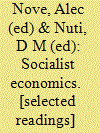

|
|
|
|
|
| Publication |
New York, Penguin Books, 1972.
|
| Description |
526p.
|
|
|
|
|
|
|
|
|
|
|
|
Copies: C:1/I:0,R:0,Q:0
Circulation
| Accession# | Call# | Current Location | Status | Policy | Location |
| 054547 | 335.008/NOV 054547 | Main | On Shelf | General | |
|
|
|
|
| 8 |
ID:
106765
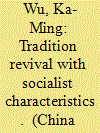

|
|
|
|
|
|
|
|